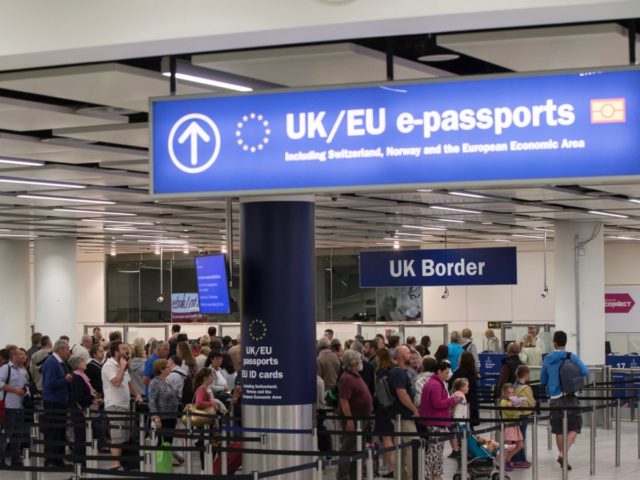The number of EU migrants who arrived in Britain under the Free Movement migration regime may have been undercounted by as much as 55 per cent.
Oxford University’s Migration Observatory has found that the number of European Union migrants applying for settlement in the United Kingdom after Brexit is far higher than the number of migrants which should have been present in the country, according to the official estimates given to the British people.
The Government had estimated that some 3.8 million European Union citizens would apply for the post-Brexit settlement scheme, but that number is likely far higher, according to the Migration Observatory report.
The report found that 155 per cent of the believed number of Bulgarians residing in the country have applied for the settlement scheme, 119 per cent of the number of Romanians, 115 per cent of the number of Italians, 111 per cent of the number of Spanianrs, 107 per cent the number of Hungarians, and 103 per cent of the number of Slovakians.
The failure of the Government to collect reliable migration numbers could have a massive knock-on effect throughout the country, as local councils, schools, and health trusts rely on the figures to plan their yearly budgets in order to not be overwhelmed by the demands of the migrant population.
“If there are higher numbers of migrants than the Government estimates, that has a huge effect on immigration numbers and for the settlement scheme,” Will Tanner, the director of the think tank Onward, told The Telegraph.
“It suggests that the settlement scheme is exposing something that previous estimates have not suggested was there.”
The massive discrepancy in migration figures was characterized as “self-evidently problematic” by the deputy director of the Migration Observatory, Rob McNeil, who called for a revamp of how the nation collects immigration data.
The United Kingdom does not collect migration statistics by counting those who enter or leave the country, but rather conducts a clipboard-based survey that measures a relatively small number of travellers, who are under no obligation answer truthfully.
The surveys, which are conducted at a relatively small number of points of entry only some of the time during the day, ask travellers where they come from, why they are coming, and how long they intend to stay, with the ONS extrapolating its immigration statistics from the answers they receive.
This lax data recording system means that “it is possible for migrants to enter on short-term visas and — unless they notify the authorities of their intention to stay longer or are really, really unlucky and are picked up in a Border Force raid — stay in the UK or leave the country years later without showing up in the official records,” according to the BBC.
Migrants arriving via the EU Free Movement regime — to which the United Kingdom is still subject, as the post-Brexit “transition” period in which is remains an EU member in all but name has not ended — can slip through the net even easier.
The current re-evaluation of EU migration numbers come as Britain has allowed agri-businesses to import thousands of Eastern European fruit pickers during the coronavirus pandemic, despite some 1.4 million Britons filing for unemployment benefits as they are either suspended from their jobs or being forced to accept reduced wages.
Follow Kurt on Twitter at @KurtZidulka

COMMENTS
Please let us know if you're having issues with commenting.